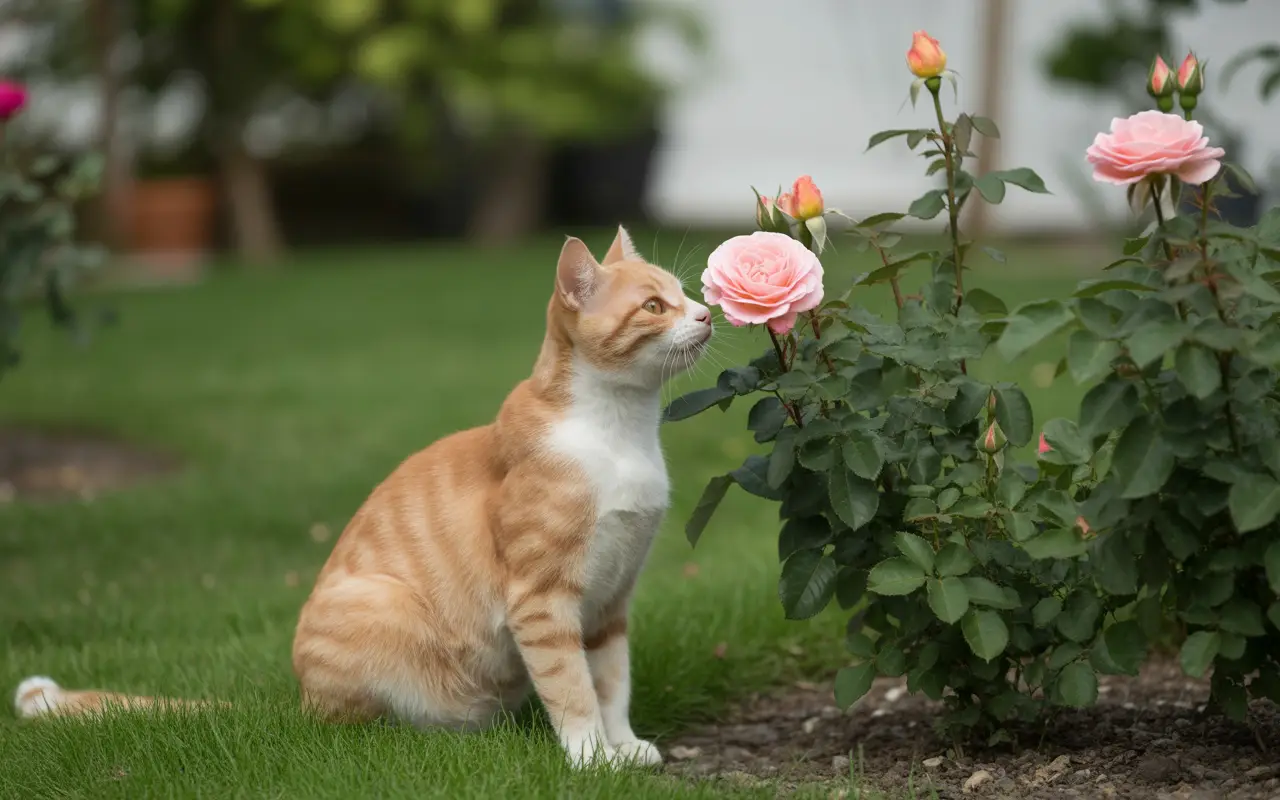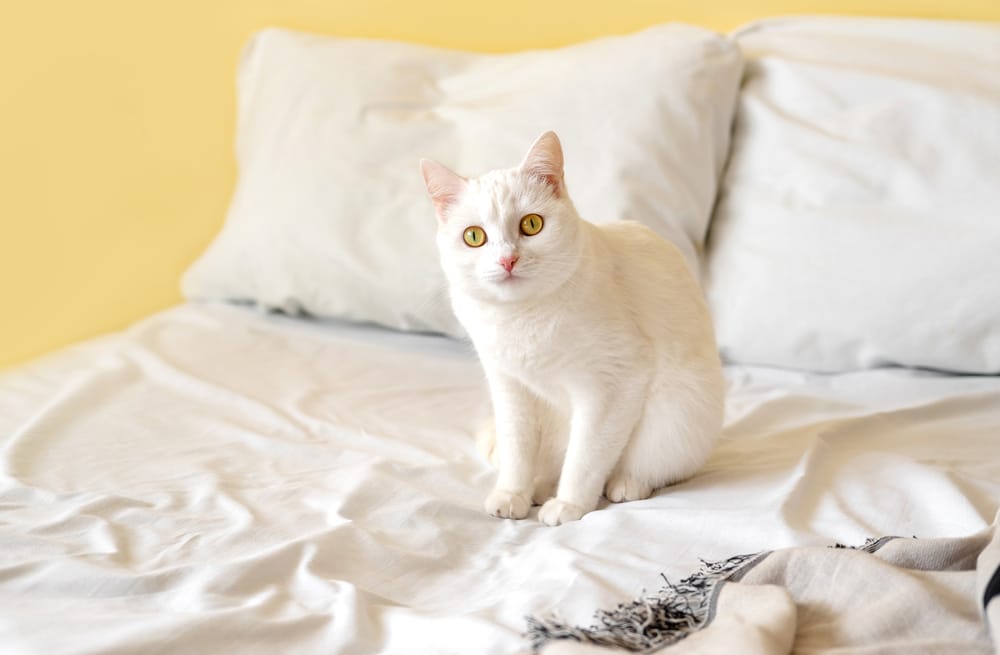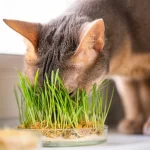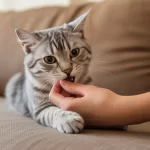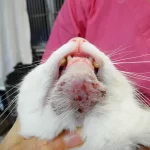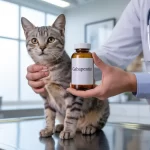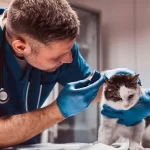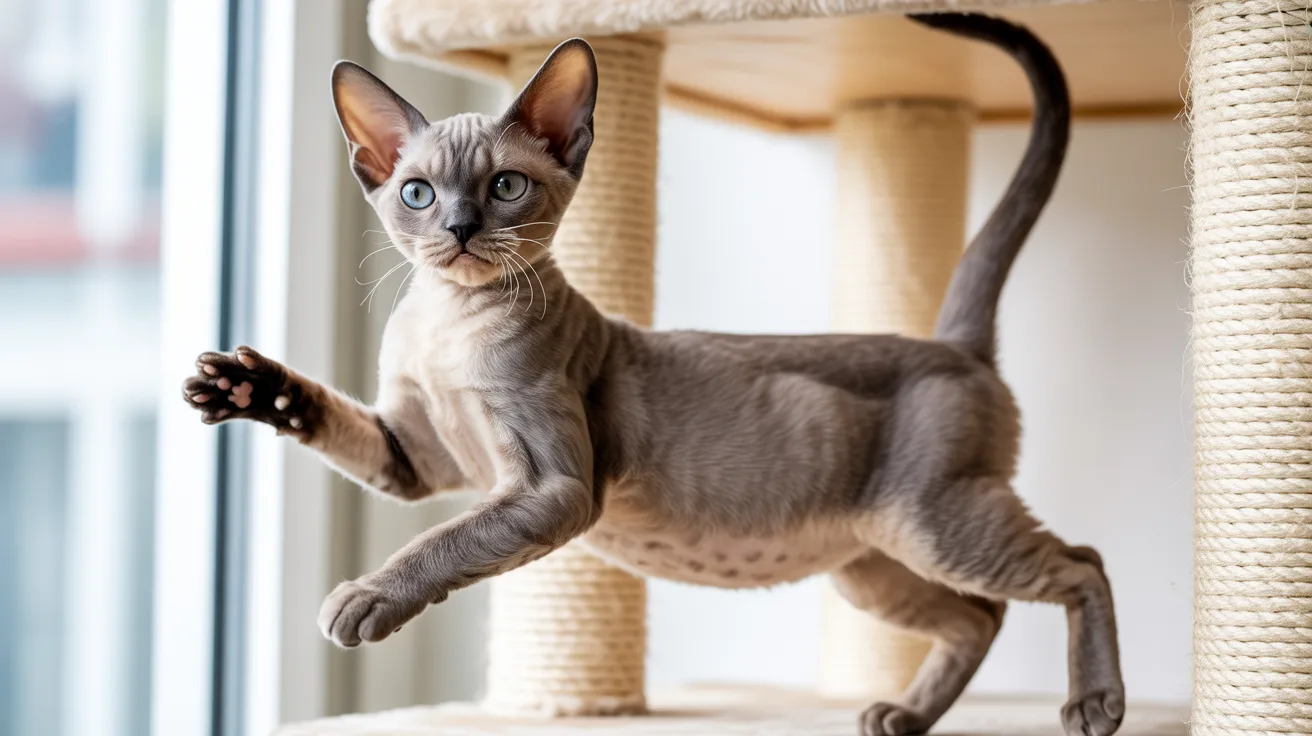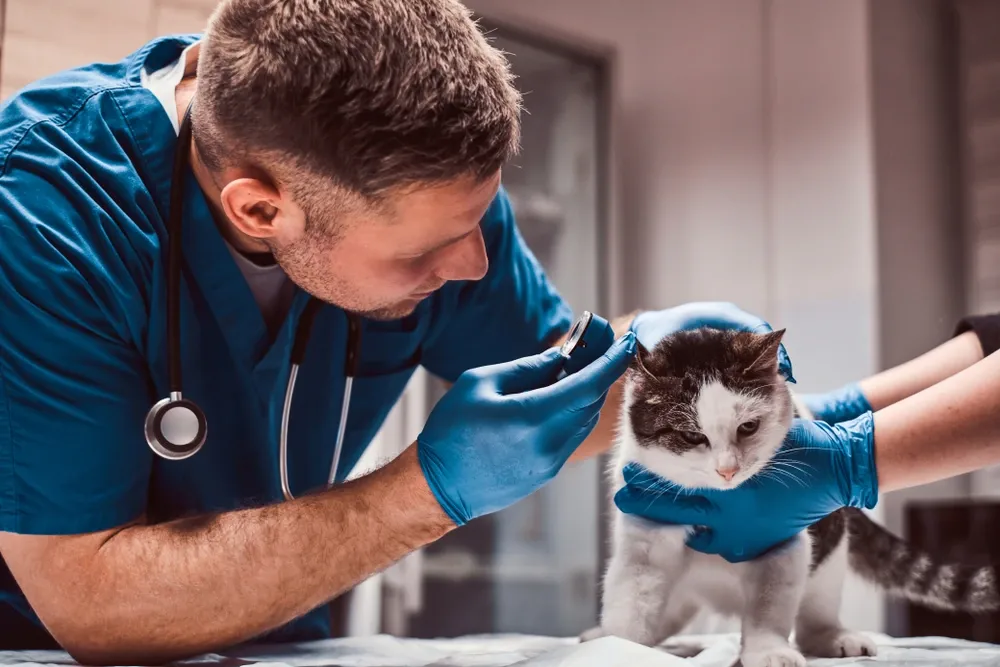If you’ve ever brought home a beautiful bouquet of roses and noticed your curious cat sniffing or nibbling the petals, you’ve probably wondered — are roses toxic to cats? The short answer is no, roses (Rosa spp.) are not considered poisonous to cats according to the ASPCA. But that doesn’t mean they’re entirely harmless.
As a lifelong cat owner and pet blogger, I’ve learned that “non-toxic” doesn’t always mean “risk-free.” While roses may not contain dangerous toxins, their thorns, pesticides, and dyes can still cause trouble for your feline friend. Let’s explore what every cat parent should know about keeping roses safely.
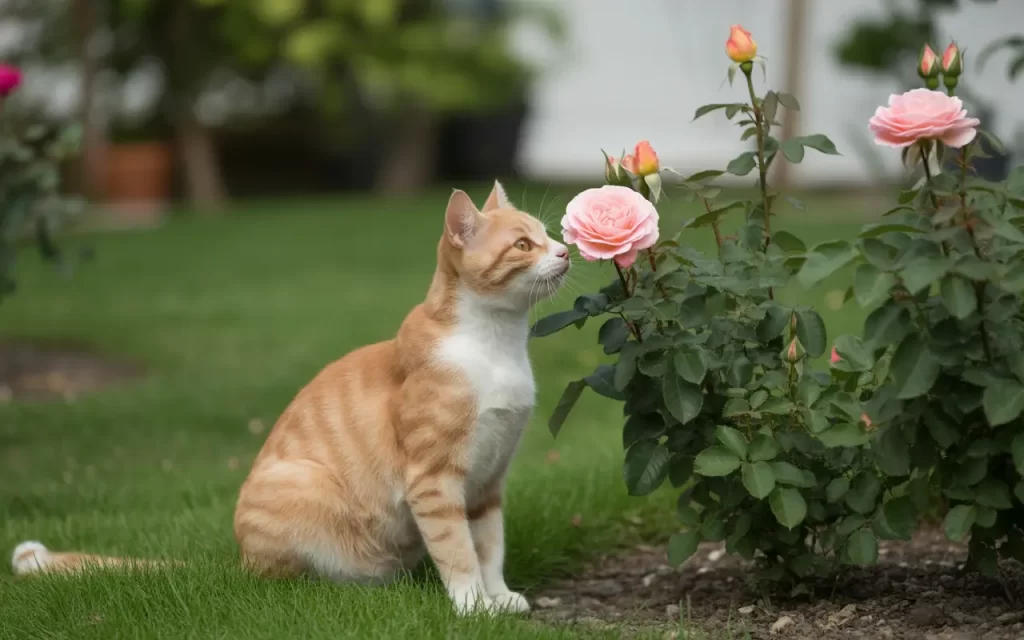
Content
Are Roses Toxic to Cats?
Here’s the good news first — true rose plants (including common varieties like red, white, and pink roses) are not toxic to cats. If your cat nibbles a petal or two, they’re unlikely to experience serious poisoning.
However, eating a large amount can lead to mild digestive upset, such as drooling, vomiting, or an upset stomach. This happens not because the rose is toxic, but because cats’ digestive systems aren’t designed to process plant matter efficiently.
Real-Life Example: A Curious Kitty and a Bouquet Mishap
A reader once shared her experience with me about her cat, Luna, who chewed on a few rose petals from a Valentine’s bouquet. Luna didn’t show any severe symptoms — just a little drooling and one mild vomit episode. A quick call to her vet confirmed it wasn’t dangerous, but they recommended removing the flowers and offering water.
This case is a great reminder that even safe flowers for cats can still cause discomfort if eaten in large quantities.
When Roses Can Become Dangerous
Even though roses themselves aren’t toxic, there are still risks to be aware of — especially if your cat likes to explore or chew on plants.
1. Thorns Can Cause Injuries
Roses’ sharp thorns can scratch your cat’s paws, nose, or mouth if they get too curious. In severe cases, a thorn may even lodge in the mouth or throat, leading to pain or infection. Always trim the thorns if you plan to keep roses where your cat can reach them.
2. Pesticides and Chemicals
Store-bought roses are often sprayed with pesticides or preservatives to keep them fresh. If your cat ingests these residues, it can lead to pesticide poisoning.
Signs of plant poisoning in cats can include:
- Excessive drooling
- Vomiting or diarrhea
- Loss of appetite
- Tremors or lethargy
If you notice any of these, contact your veterinarian immediately.
3. Dyed or Artificial Roses
Dyed roses and artificial flowers may look stunning, but the coloring agents or synthetic materials can irritate your cat’s mouth and stomach. If your bouquet contains colored or sprayed roses, keep them well out of reach.
Can Eating Roses Make Cats Sick?
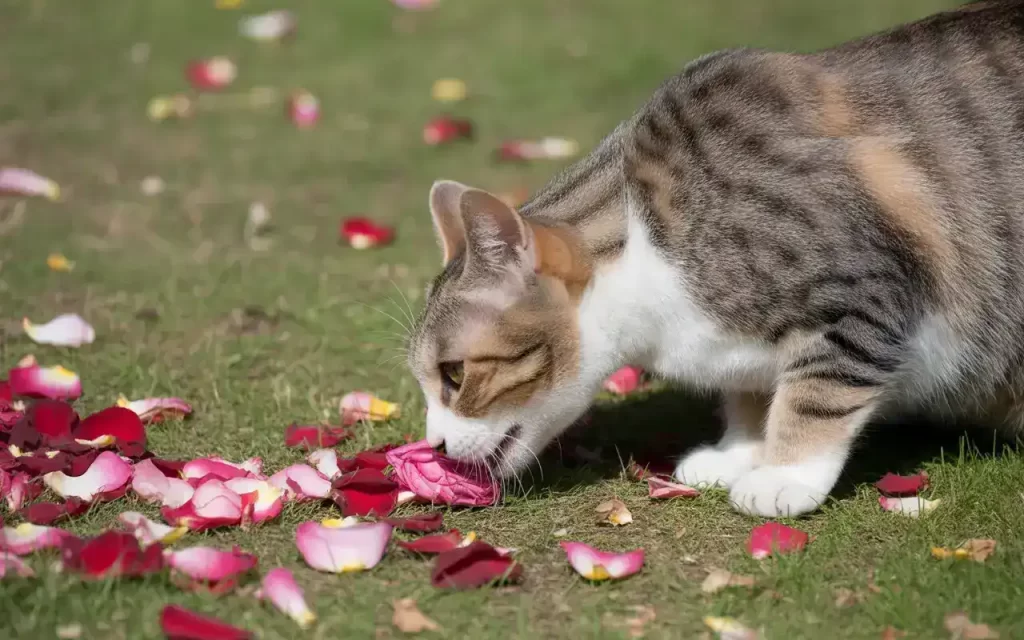
If your cat eats a few petals, they may experience mild stomach irritation, drooling, or vomiting — mostly due to the fibrous plant material. However, are rose petals poisonous to cats? Not in the toxic sense.
The real risk lies in thorns, chemicals, or the quantity eaten.
If your cat is prone to chewing plants, consider offering cat-safe alternatives like wheatgrass or catnip, which are completely non-toxic and even beneficial for digestion.
Read More About: Pembroke Welsh Corgi
Are All “Roses” Really Roses?
Interestingly, not every plant with “rose” in its name is an actual rose. Some “rose” lookalikes are toxic to cats and can cause serious harm if ingested. Here are a few examples:
| Plant Name | Toxic to Cats? | Notes |
|---|---|---|
| Desert Rose (Adenium obesum) | Yes | Contains toxic sap that affects the heart |
| Christmas Rose (Helleborus niger) | Yes | Can cause drooling, vomiting, or diarrhea |
| Primrose (Primula vulgaris) | Yes | May cause skin irritation and stomach upset |
So, before you bring home a plant labeled “rose,” double-check its scientific name. True roses (genus Rosa) are safe; imposters are not.
What To Do If Your Cat Eats a Rose
If your cat nibbles a rose, stay calm — most cases aren’t serious. Here’s what you should do:
- Remove the plant from your cat’s reach.
- Rinse their mouth gently with clean water if there’s residue.
- Monitor for symptoms such as vomiting, drooling, or lethargy.
- If symptoms persist, contact your vet or the ASPCA Animal Poison Control Center.
Remember, early action is always the safest choice, even when dealing with non-toxic plants.
Are Roses Toxic to Cats? Safe Flower Alternatives for Cat Owners
If you love decorating with flowers but want to be cautious, here are a few cat-safe plants and flowers that add beauty without risk:
- Sunflowers
- Orchids
- Snapdragons
- Zinnias
- Marigolds
- Roses (chemical-free and thorn-trimmed)
Avoid lilies, tulips, and azaleas, as these are toxic flowers for cats and can cause severe health issues even in small amounts.
How to Keep Your Cat Safe Around Flowers
Even if you use safe plants, prevention is better than cure.
Here are some practical tips:
- Place flowers out of reach on high shelves or hanging vases.
- Train your cat with gentle redirection when they approach plants.
- Use deterrents like citrus scents or double-sided tape near vases.
- Provide enrichment — scratching posts, cat grass, and toys reduce curiosity about plants.
Final Thoughts: Are Roses Toxic to Cats?
So, are roses toxic to cats?
No — true roses are not poisonous, but they’re also not entirely risk-free. Thorns, dyes, and chemical residues can still cause harm if you’re not cautious. As a responsible pet parent, always choose organic, thorn-free roses and keep them out of your cat’s playful reach.
Having flowers at home doesn’t have to mean worry. With a little awareness and care, you can enjoy your blooms and keep your furry friend safe and happy.
If you love elegant and gentle breeds, explore our detailed guide on the Russian White Cat to learn about its personality, care, and unique charm.
FAQs
What happens if my cat eats roses?
Most cats only get mild stomach upset. Watch for vomiting or drooling and contact your vet if it continues.
Can I have roses in the house with cats?
Yes. Keep thorn-free, pesticide-free roses out of reach to avoid injuries or accidental chewing.
Why do cats like to eat roses?
Cats may chew roses out of curiosity, texture interest, or boredom—not because they enjoy the taste.
What is the most toxic flower to cats?
Lilies are extremely toxic to cats. Even small amounts can cause kidney failure, so avoid them completely.

Join Felipe Clark on a heartwarming journey through the world of pet adoption. He’s a true advocate for shelter animals, sharing stories that tug at the heartstrings and inspire adoption.

